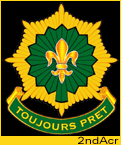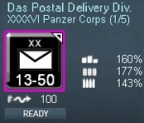MengJiao
Posts: 232
Joined: 12/18/2010
Status: offline

|
quote:
ORIGINAL: ComradeP
The French did it in France they did not rail troops across hundreds of miles.
I don't object to the current strategic movement per se, but I do agree that it's somehow odd that you can pick up a unit in Dothexgrad, Russian SFSR, move it to the front and drop the unit there in one turn (or move it from Dothexstadt, Germany, to a place in Byelorussia, the Ukraine or Lithuania) without the unit losing combat effectiveness even temporarily.
The oddest thing about that is that rail movement causes little fatique, so if you rail a unit a substantial distance and drop it somewhere hundreds of miles away, it might have less fatique than a unit moving to the hex from 5 to 10 hexes away.
Of course, rail transport over significant distances still takes two to three weeks and might actually be slower than some priority movements in the actual war.
I think early 20th century armies were designed to get maximum advantages from railroads. The French moved troops from near Switzerland to near Paris (surely 200 miles) in less than a week and went to the attack and won.
Anyway, loading and unloading are the relatively time-critical parts of a rail move. The train itself gets you hundreds of miles with relatively little trouble which is the whole point.
I agree the Soviets seem fantastically flexible, but to build in a real administrative and signal system would begin to approach a game only I would enjoy:
It seems to me the idea East Front game would be one that gave you an operational area say Riga to Leningrad -- not too big -- and then let you try out different variables in building armies for each side. For example, you could take a 1923 ideal Wehrmach just as it starts using radios on the road and put it up against a 1923 Red Army which has a pretty flexible command structure, armored trains and so on and let them fight it out at the company/battalion level in a daily orders cycle. Another interesting variation would be a ideal Red Army of 1939 with a good command structure, good signal/radio doctrine and lots of light tanks. It might do well against say a German army with less flexible command and less emphasis on radio/signal training.
For me, the less abstraction the better. In my ideal simulation, every radio message would be tracked and possibly intercepted and/or radio located by the other side. The game would focus on the army cheif-of-staff's situation: checking the radio and recon picture at 5AM. Dealing with visiting Commisars and/or STAVKA at 8AM. Getting the army commander his hang-over cure at 9AM. Sending the ARmy Commander off to help morale at some point on the front and so on. In my ideal game, as the Cheif-of-Staff, you would look at information on your maps that might be wrong and make your assessments (which might push your intelligence expectations in the wrong direction) and worry about how long it takes to get a tank brigade off the trains and fueled and assembled.
Anyway, there's a lot that gets abstracted in WitE, but I think, given the level (ie the whole front with weekly turns) there are other benefits.
Not my cup of tea. I would be more interested in an army or front level game with the player in the position of the Front or Army staff.
|
 Printable Version
Printable Version









 New Messages
New Messages No New Messages
No New Messages Hot Topic w/ New Messages
Hot Topic w/ New Messages Hot Topic w/o New Messages
Hot Topic w/o New Messages Locked w/ New Messages
Locked w/ New Messages Locked w/o New Messages
Locked w/o New Messages Post New Thread
Post New Thread